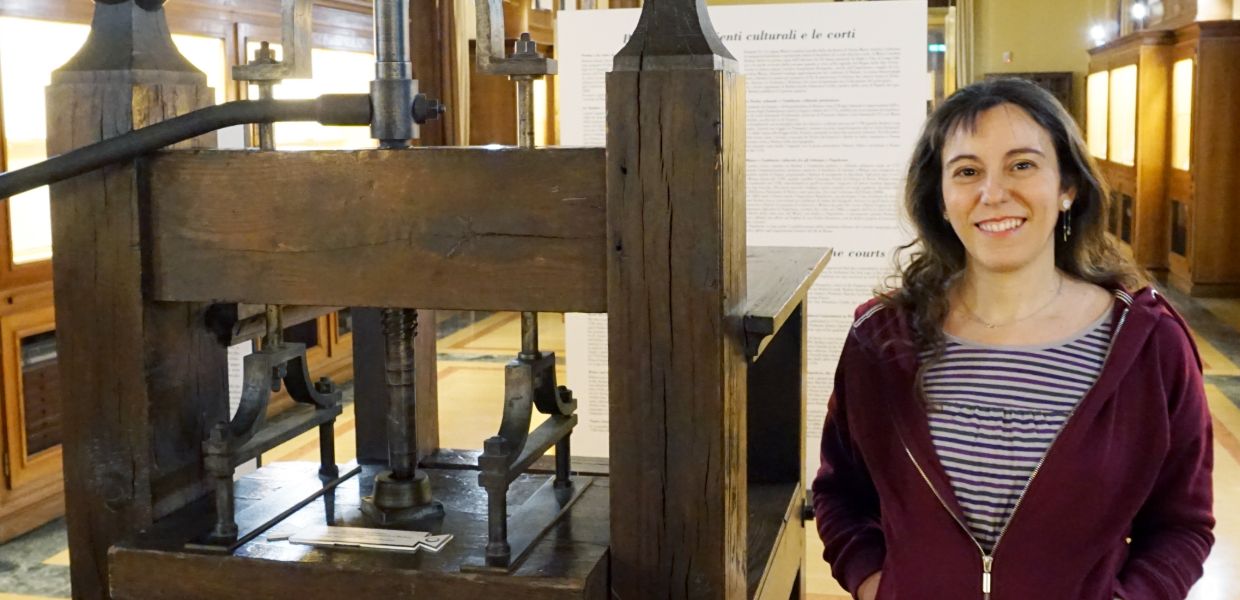Professionals in Focus: Flavia Bruni, librarian at ICCU, Italy
Are you interested in the interesting and complex jobs in digital cultural heritage? So are we. So each month we are going to take a deep dive into the work of professionals in the sector. This time, we speak with newly elected Members Councillor Flavia Bruni on 16th-century books and national cataloguing.

- Title:
- Flavia Bruni
- Creator:
- Tancredi Gullò
- Country:
- Italy
- Copyright:
- CC BY-SA
About Flavia…
Immediately after my graduation in History of the Age of the Reformation and Counter-reformation, I joined a research project on 16th-century book inventories. This prompted my need for expertise on early printed books, and especially how to describe them, which turned into a passion that led me to further specialisation. This is how I have become a book historian, a bibliographer and, after working for many years as a cataloguer and as a research fellow, a librarian at the Central Institute for the Unique Catalogue of Italian Libraries and Bibliographic Information (ICCU), where I work for the department responsible for cataloguing standards, guidelines and tutorials, and for that for the bibliography, cataloguing and survey of early printed books.
What are you currently working on?
I am currently busy with my colleagues on the development of a new website that will allow people to search through all the online catalogues managed by our Institute in one go, providing access to several types of media including books, postcards, music, manuscripts and digital resources, to mention just a few. This also involves a complete technical renovation of EDIT16, our database comprising the Italian national bibliography for the 16th century - my main expertise. Needless to say, such an ambitious project needs considerable effort, but we welcome this sort of professional challenge with a great deal of enthusiasm!
What are some of the challenges in your role? What are some of your favourite elements?
Weirdly enough, I am a librarian who does not work in a library. The Institute I work for manages SBN, the union catalogue of Italian libraries. This is a delicate role, especially challenging as our decisions impact heavily on the national cataloguing policy. In order to make it work, we need to be in constant touch with hundreds of librarians and cataloguers working in more than 6,400 libraries all around Italy. Thanks to my role I meet many colleagues who are very passionate about their job. The exchange with them is one of my favourite sides of my work, together with travelling to visit their libraries!
What was your motivation for joining the Members Council?
I am a librarian with an academic background. I worked as a post-doctoral research fellow for several institutions in Italy and abroad. I am still an Honorary Research Fellow in Book History at the School of History of the University of St Andrews and struggle to combine my daily work as a specialised librarian with academic research. I teach courses in book history and material bibliography to graduate students and professional librarians as well as to a wider audience. This means I know very well the challenges scholars have in finding the resources they need for their research. Being a Members Councillor is a substantial opportunity to transform this awareness into useful expertise to contribute to the design of new features and ways to make Europeana match users’ needs.
What do you plan to do as a Members Councillor?
I have a strong interest and experience in the digital humanities, especially in the digitisation of manuscripts and early printed books, text encoding, semantic web and digital preservation. As a longstanding user of Europeana Collections, I would be keen to contribute to making the digital content available on Europeana of higher quality, more easily accessible and open for reuse, especially in academic research and teaching. This matches the core mission of my Institute, as the national institution responsible for harmonising digitisation practices and for the enrichment of digital cultural heritage in Italy, and the new Implementation Roadmap for the European Open Science Cloud.
Are you interested in finding out about a career in digital cultural heritage? Read about the interesting roles of our Members Councillors, or visit the Europeana jobs page for any new opportunities.


